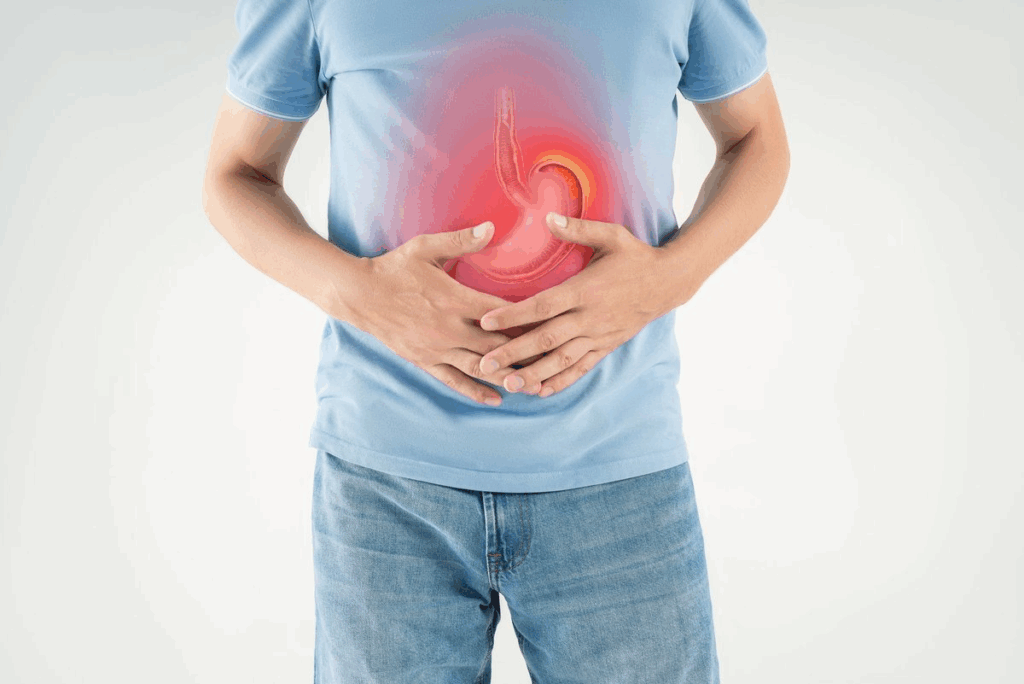Last Updated on October 30, 2025 by Bilal Hasdemir

Having a life after colectomy can change your life, but you can adjust and do well with the right help. A colectomy means removing part or all of the colon. It’s often needed to treat or prevent colon diseases. Life after colectomy requires big changes, both physically and emotionally. Yet, many people lead happy and active lives after surgery. With care from places like Liv Hospital, you can get the support you need for this new chapter. How your body recovers is key. Knowing what to expect and the steps for a healthy life post-colectomy can really help.

Colectomy surgery is a big medical step. It removes part or all of the colon. This is often needed for cancer or inflammatory bowel disease. It’s chosen when other treatments fail or the condition is urgent.
Many health issues might lead to a colectomy. These include:
These problems can really affect someone’s life. Colectomy can be a key step towards getting better.
The surgery type depends on the disease or damage extent and location. The main types are:
| Type of Colectomy | Description |
| Total Colectomy | Removal of the entire colon. |
| Partial Colectomy | Removal of a part of the colon. |
| Hemicolectomy | Removal of one side of the colon. |
Each colectomy is customized for the patient. The surgeon picks the best procedure based on the patient’s needs.
After a colectomy, the body uses the small intestine more for absorbing nutrients and water. The small intestine works harder to make up for the colon’s loss.
Adapting can differ for everyone, but most people can live active lives after recovery. Knowing how the body adapts is key to managing life after a colectomy.

Knowing what to expect after colectomy surgery can make the recovery easier. The process involves watching for complications, managing pain, and understanding the healing journey.
Patients usually stay in the hospital for a few days after surgery. The healthcare team keeps a close eye on them for any signs of trouble. How long you stay depends on your health and the surgery details.
Immediate post-operative care focuses on watching for infections, managing pain, and helping the digestive system start working again. Doctors also teach wound care and schedule follow-up visits.
Managing pain is key during recovery. Doctors give pain meds to help with discomfort, adjusting the dose as needed.
Healing the wound is also important. Patients learn how to care for their wounds to avoid infections and speed up healing.
It’s vital to know the signs of complications like infections, bowel blockages, or dehydration. Look out for severe belly pain, fever, vomiting, or big changes in bowel movements.
| Complication | Symptoms to Watch For |
| Infection | Fever, redness or swelling around the wound, increased pain |
| Bowel Obstruction | Severe abdominal pain, vomiting, constipation |
| Dehydration | Excessive thirst, dark urine, dizziness |
Full healing takes several months. Getting personalized support and care is key to a good recovery.. By knowing what to expect and how to manage recovery, patients can smoothly transition after colectomy.
After a colectomy, people need time to adjust to their new body functions. This time is key for getting stronger and getting used to the surgery changes.
One big change after a colectomy is how the bowel works. People might go more often or have trouble with stool. Some might go too often, while others might have trouble controlling it.
Adaptation Strategies:
After surgery, many people feel less energetic. They might find it hard to do physical tasks because of the surgery and recovery.
Tips for Managing Energy Levels:
How fast people get better varies. Usually, it takes several months to see big improvements in physical health.
| Timeframe | Expected Physical Improvements |
| 1-3 months | Energy levels start to rise, initial recovery from surgery |
| 3-6 months | Bowel function gets better, more energy for activity |
| 6-12 months | Big recovery, back to most normal activities |
Knowing about these physical changes helps people adjust to life after a colectomy. They can then live a normal and happy life again.
After a colectomy, it’s key to change your diet. The small intestine now absorbs nutrients. It’s vital to eat foods that help with digestion and overall health.
Choosing the right foods is important for digestion after a colectomy. Nutrient-rich foods that are easy to digest should be your focus. Here are some good options:
Some foods can make digestion harder after a colectomy. It’s best to limit or avoid:
Good meal planning for nutrition and digestion. Here are some tips:
Following these dietary tips can help those without a colon manage their nutrition. It supports their digestive health and improves their quality.
It’s key to stay hydrated if you don’t have a colon. After a colectomy, your body changes how it absorbs water and salts. So, drinking the right amount of water is very important.
People who have had colectomy surgery should drink lots of water. Aim for 8-10 glasses a day. But your needs might change based on how active you are and where you live.
Tips for meeting daily fluid requirements:
It’s important to know the signs of dehydration. Look out for:
If you notice these signs, drink more water. If they don’t go away, talk to your doctor.
Electrolytes like sodium, potassium, and magnesium are important for staying hydrated. After a colectomy, you might need to add them to your diet.
Methods for electrolyte supplementation:
Knowing how to stay hydrated is key. By following these tips, you can keep your health in check and avoid problems.
Living without a colon means using an ostomy bag. This surgery creates an opening in the abdomen for waste. It’s a process that needs careful management.
There are different types of ostomies, each with its own appliance. The most common types are:
Knowing the type of ostomy and the right appliance is key tgtmanagementnt.
| Ostomy Type | Appliance Characteristics | Care Considerations |
| Colostomy | Usually,, a pouching system with a barrier | Regular cleaning and monitoring for irritation |
| Ileostomy | Often requires a drainable pouch | Frequent emptying and skin care |
| Urostomy | Typically involves a urostomy pouch | Night drainage systems and regular appliance changes |
Daily care includes cleaning the stoma and skin, checking for complications, and keeping the appliance in good shape. Proper hygiene is key to avoiding infections.
A daily routine might include:
Issues like skin irritation, leakage, and appliance problems are common. Identifying the cause is the first step to fixing it.
For skin irritation, using a skin barrier or adjusting the appliance can help. For leakage, check the appliance’s fit and adhesion.
By knowing about ostomies, following care routines, and solving common problems, people can manage life with an ostomy well. They can live active and fulfilling lives.
Emotional well-being is key after colectomy surgery. People may feel many emotions, like relief and gratitude, but also anxiety and depression. Adjusting to life without a colon can be tough.
Adjusting to physical changes is a big challenge after colectomy. This includes getting used to an ostomy and changes in bowel function. It’s important to accept these changes and seek help when needed.
Here are some ways to cope:
Many people feel anxious and depressed after a colectomy. These feelings can come from the surgery itself, changes in body image, or worries about the future. It’s important to manage these emotions for overall well-being.
Here are some ways to manage anxiety and depression:
Finding the right support is vital for emotional well-being after rectal surgery. Support groups, whether in-person or online, offer a sense of community. There are also many resources to help with emotional recovery.
Some valuable resources include:
By facing the emotional challenges of living without a colon and seeking support, people can improve their emotional well-being. This can greatly enhance their quality of life.
Recovering from a colectomy means slowly getting back to daily life. This includes work, exercise, and social activities. Patients look forward to regaining their independence and resuming their routines. “The ability to return to normal activities is a significant milestone in the recovery process.”
The time it takes to get back to activities varies. It depends on health, the type of surgery, and any complications. Generally, patients can start with light activities a few weeks after surgery.
Exercise is key for recovery and health after a colectomy. But some changes areneeded.
Tips for exercising after colectomy:
Social situations and travel can be tricky after a colectomy, thanks to an ostomy. “Planning and being prepared can make a big difference,” notes Jane Doe, an ostomy support group leader.
When traveling, it’s essential to:
Understanding the recovery timeline, making necessary changes, and planning help individuals get back to their normal activities after a colectomy.
Long-term health monitoring after a colectomy is very important. It helps prevent complications and improves life quality. It’s key for those who have had this surgery.
Regular visits with healthcare providers are vital. They help monitor health and catch any problems early. These visits check the surgical site and overall health, and discuss any symptoms.
Key components of follow-up appointments include:
Screening and prevention are key in long-term health monitoring. People who have had a colectomy might need different screening schedules. This includes tests for cancer or other digestive diseases.
Prevention strategies may involve:
Keeping up with the latest research and advances in colectomy care is important. It helps find the best ways to manage the condition. This includes new surgeries, better post-operative care, and nutrition advice.
| Area of Research | Advances | Potential Benefits |
| Surgical Techniques | Minimally invasive surgeries | Reduced recovery time, less scarring |
| Post-operative Care | Enhanced pain management protocols | Improved comfort, reduced risk of complications |
| Nutritional Guidance | Personalized dietary plans | Better nutritional outcomes, improved overall health |
By staying involved with healthcare and proactive about monitoring, people can greatly improve their life after a colectomy.
Life after a colectomy can be tough, but it’s possible to thrive. Learning to live without a colon is key to a happy life. It’s all about adapting to the changes.
Following dietary advice, staying hydrated, and finding ways to cope with emotions can help a lot. These steps can make managing your condition easier. They also improve your overall health and well-being..
Accepting the changes and keeping an eye on your health long-term is important. It helps you feel more confident in your new life. With the right attitude and support, living well after a colectomy is definitely achievable.
Yes, many people can live a normal life after having their colon removed. They need to make some changes to their diet, how they drink, and their lifestyle.
Without a colon, you have to get used to new bowel habits. You also need to manage your water and salt levels. And you’ll have to change your diet to help your digestion.
After surgery, you should eat small meals often. Stay away from foods that can upset your stomach or cause diarrhea. Drinking lots of water is also key to avoiding dehydration.
Recovery time varies, but it usually takes weeks to months. You’ll need time to adjust to your new situation.
Yes, you can exercise after surgery. Start slow and gradually increase your activity. This helps avoid any problems.
Managing an ostomy means learning how to care for it properly. You’ll need to deal with common issues and get used to the physical and emotional changes it brings.
Dehydration signs include feeling very thirsty, dark urine, dizziness, and tiredness. If you notice these, get medical help right away.
Follow-up appointments depend on your situation. But seeing your doctor regularly is important to check on your health and address any issues.
Yes, you can travel after surgery. Just plan carefully, research medical facilities where you’re going, and take steps to manage your condition while on the move.
Living without a large intestine means adapting to new bowel habits and managing your water and salt levels. You’ll also need to change your diet to support your digestion, similar to living without a colon.
Subscribe to our e-newsletter to stay informed about the latest innovations in the world of health and exclusive offers!
WhatsApp us